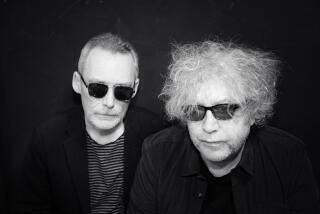Lou Reed on TV: It watched him for a little while
- Share via
“I watched it for a little while,” sang the late Lou Reed, of a satellite that went way up to Mars. “I love to watch things on TV.”
TV watched him for a little while, too, once that whole video thing got going and his importance as a songwriter and performer was widely established.
Reed, who died Sunday, began as the principal songwriter and vocalist of the Velvet Underground -- along with Elvis and the Beatles, one of the three most influential rock acts of the 20th century. Which is just crazy to think about, in a good way, if you have ever spent any time with “I Heard Her Call My Name” or “European Son” or “Sister Ray.” The Velvets represented not only an assault on late-’60s notions of pop worthiness (while creating some of its most enduring pop songs), but a refusal of the musical and lyrical commonplaces of the era’s so-called underground acts as well. Imagine them at Woodstock, and laugh.
Around for a relatively short time, in a time before their time -- Ed Sullivan or Dick Clark would have no use for them -- and a time before MTV, the Velvets left behind few moving pictures. (Notwithstanding their brief 1992 reunion, which was of course recorded.) But their association with Andy Warhol and by extension the New York City avant-garde film scene did ensure that snippets do exist; many of these, along with scenes from Reed’s better documented solo years, can be seen in the documentary films embedded above and below.
“Lou Reed: Rock and Roll Heart” (above), a 1998 entry in the PBS series “Amerian Masters,” follows the artist from childhood, through the Velvets and the ups and downs and ups of his solo career to his 1996 Robert Wilson collaboration, “Time Rocker.” Like most “American Masters” films, it is a testimonial; voices raised in his praise include David Bowie, Patti Smith, David Byrne, Thurston Moore and Vaclav Havel.
In the “Charlie Rose” clip directly below, he discusses that film, his life and his work. Not publicity-shy so much as reporter-averse -- you couldn’t really call yourself a pop journalist until Lou Reed made you cry -- he is in an unusually relaxed, cheery, generous and self-effacing mood.
“Do you think of yourself as a legend?” Rose asks. “Not for an nth of a second,” Reed replies. As to his legacy, “I don’t know that I’ve made an individual contribution, I was part of a group that along with Warhol may have given a little nudge to multimedia, perhaps. Maybe the subject matter that could be written about in rock.” Most interesting are his memories of his college years and youthful ambitions (including, ironically, journalism). And he imitates Marlon Brando.
The Velvet Underground is the whole subject of the terrific U.K. documentary below, a 1986 edition of ITV’s “The South Bank Show.” Reed and former bandmates John Cale, Sterling Morrison and Maureen Tucker all are interviewed, along with brief fellow traveler Nico, who sings a bit of “Femme Fatale.” You get a lot of the snippets mentioned above, plus footage from a Reed-Cale-Nico reunion in Paris, 1972.
Film was the medium at the Factory. Video conquered music at the dawn of the 1980s, and Reed, like everyone else working at the time, occasionally got with the program, with not surprisingly mixed results. In “I Love You Suzanne” (1984), he rides a motorcycle, smokes a cigarette and serenades and busts a move with an echo of Edie Sedgwick (or so it always struck me). “Legendary Hearts” (1983) finds him hemmed in by new-wave graphic elements. These exercises in industrial earnestness could be confusing to the older fans -- they dominate Reed rather than the other way around -- but have their antique charms.
More to Read
The complete guide to home viewing
Get Screen Gab for everything about the TV shows and streaming movies everyone’s talking about.
You may occasionally receive promotional content from the Los Angeles Times.







